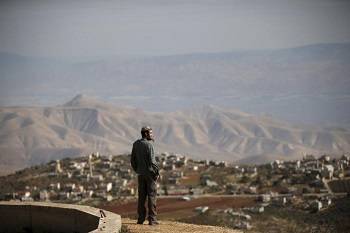Israel has passed a controversial bill that retroactively legalizes thousands of settler homes built on privately owned Palestinian land in the occupied West Bank, drawing widespread anger by Palestinian leaders and rights groups.
The Israeli Knesset voted 60 to 52 to approve the contentious bill late on Monday despite warnings by the government's top lawyer who had previously called it "unconstitutional".
Minutes after the vote, the Palestine Liberation Organization (PLO) slammed the new law as a means to "legalese theft" of Palestinian land.
The law demonstrated "the Israeli government's will to destroy any chances for a political solution," the PLO said in a statement, stressing that the "Israeli settlement enterprise negates peace and the possibility of the two-state solution".
The so-called "Regulation Bill" applies to about 4,000 settlement homes in the West Bank for which settlers could prove ignorance that they had built on privately owned land and had received encouragement from the Israeli state to do so.
The bill is seen as another step towards at least partial annexation of the West Bank, and could lead to a host of illegal settlements built on privately owned Palestinian land being legalized retroactively.
Three Israeli NGOs - Peace Now, Yesh Din and the Association for Civil Rights in Israel - said they intend to petition the Supreme Court to cancel the law.
"This law will make theft an official Israeli policy by retroactively legalizing illegal construction on private lands," said Anat Ben Nun, a spokesman for the anti-settlement organization Peace Now.
International law considers all settlements to be illegal, but Israel distinguishes between those it sanctions and those it does not, dubbed outposts.
The bill was a key demand for parts of Israeli Prime Minister Benjamin Netanyahu's right-wing cabinet, including the hardline Jewish Home party, which argues that settlers would be able to live without fear of being driven from their homes - many of which they have lived in for years.
The government's attorney general, however, has said that the bill was unconstitutional and would contradict Israel's legal obligations under international law.
Israeli MK Tzipi Livni warned that it would lead Israeli soldiers to the International Criminal Court.
The bill would apply to 53 other outposts and homes within existing settlements recognized by Israel built on Palestinian land, according to Peace Now.
More than 3,800 homes would be "legalized", the NGO said.
The parliamentary session before the final readings began on Monday afternoon but was adjourned a short while later after all opposition members withdrew their reservations.
Dov Khenin of the Arab Joint List said the opposition would not cooperate with the bill's legislative process, accusing its proponents of acting counter to regulations.
Though passed, the bill could still be challenged.
Defense Minister Avigdor Lieberman said last week: "The chance that it will be struck down by the Supreme Court is 100 percent."
Al Jazeera's Imran Khan, reporting from West Jerusalem, said the Palestinian land owners could take their case to the Supreme Court as early as Tuesday.
"The Palestinian Authority says it has to see what happens next, and [will decide] whether they have to go to the ICC or the UN," he added.
Amona demolitions
Last week, a few hundred residents of the Amona outpost in the West Bank were evicted after the Supreme Court ruled that their homes were built on private Palestinian land.
In parliament on Monday, Shuli Mualem, of Jewish Home, dedicated the law to the people evicted from Amona.
The lengthy Amona saga - including the evictions broadcast live on Israeli television - directly inspired the bill.
Nickolay Mladenov, the United Nations envoy for the Middle East peace process, said on Monday that he was "concerned" by the recent bill as it would "enable the continued use of privately owned Palestinian land for Israeli settlements".
"If adopted into law, it will have far-reaching legal consequences for Israel and greatly diminish the prospects for Arab-Israeli peace," he added.
Bezalel Smotrich, of the Jewish Home party, who was one of the forces behind the legislation, thanked the American people for electing Donald Trump as president, "without whom the law would have probably not passed".
The White House's immediate response was to refer to its statement last week that said the construction of new settlements "may not be helpful" in achieving Israeli-Palestinian peace.
The state department later said: "The Trump administration will withhold comment on the legislation until the relevant court ruling."
Since Trump's inauguration, Israel has announced more than 6,000 new homes in the West Bank, including East Jerusalem, seen as key parts of any future Palestinian state.
While Trump's administration last week expressed reservations over Israel's settlement expansion, it also broke with previous administrations by saying settlements were not an obstacle to peace.
"President Trump hasn't been as strong on condemnation of settlements as previous US administrations," Al Jazeera's Khan said.
"With this bill, Netanyahu is playing to his domestic audience ... supporters have been pushing him to go even further. He can simply turn around and say, 'I tried my hardest'."
Under the bill, Palestinian owners would be financially compensated by Israel, but could not sell their land.
PHOTO CAPTION
A Jewish settler stands at an observation point overlooking the West Bank village of Duma, near Yishuv Hadaat, an unauthorized Jewish settler outpost January 5, 2016. REUTERS
Al-Jazeera


 Home
Home Discover Islam
Discover Islam Quran Recitations
Quran Recitations Lectures
Lectures
 Fatwa
Fatwa Articles
Articles Fiqh
Fiqh E-Books
E-Books Boys & Girls
Boys & Girls  Ramadan
Ramadan Fatwa Audios
Fatwa Audios Month of Mercy
Month of Mercy Women
Women Eed Al- Fitr
Eed Al- Fitr Food Recipes
Food Recipes Videos
Videos

 Prayer Times
Prayer Times












